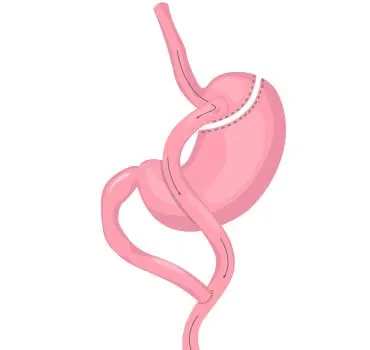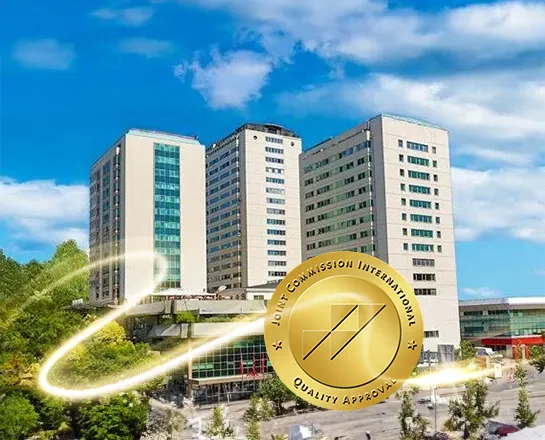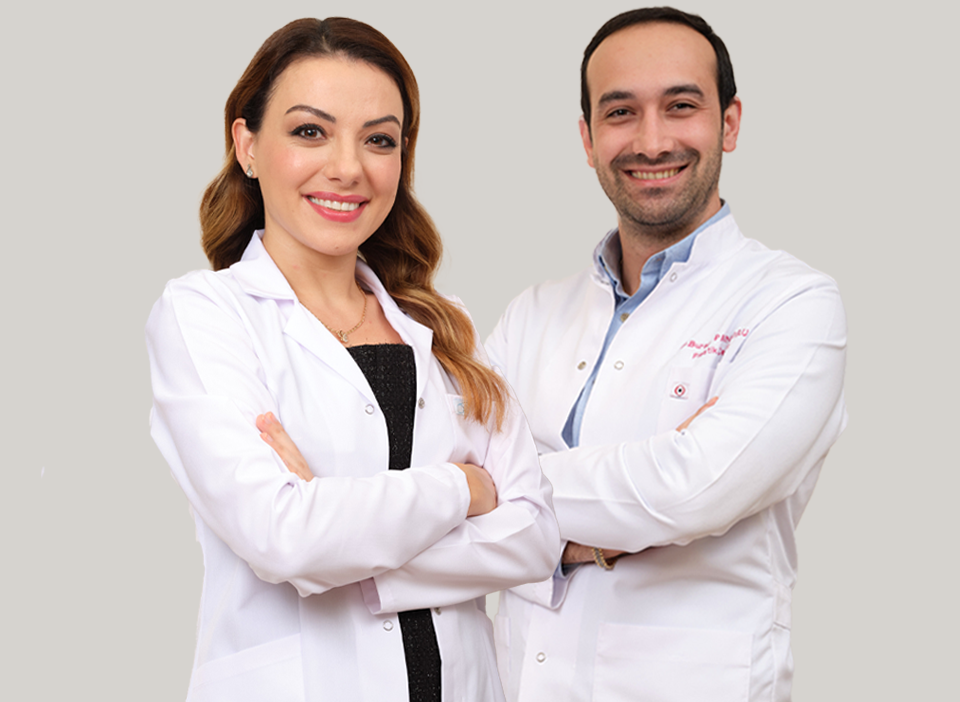Gastric Bypass

Gastric Bypass

Gastric Bypass
Gastric bypass surgery, also known as Roux-en-Y gastric bypass, is a transformative bariatric procedure designed to facilitate significant weight loss by altering the digestive system. This surgery not only restricts food intake by creating a smaller stomach pouch but also changes the way food is absorbed by bypassing a portion of the small intestine. As a result, patients experience an early sense of fullness alongside a reduction in the number of calories absorbed by the body. Ideal for individuals struggling with obesity and related health conditions, gastric bypass offers a profound impact on weight management and can lead to substantial improvements in overall health and quality of life when combined with lifestyle changes.
What is Gastric Bypass?
Gastric bypass, formally known as Roux-en-Y Gastric Bypass (RYGB), is a highly effective weight loss surgery that has become a cornerstone procedure in bariatric medicine. It involves creating a small pouch from the stomach and connecting it directly to the small intestine, effectively bypassing a large part of the stomach and a segment of the small intestine. This not only severely limits the amount of food that can be consumed at any one time, promoting a feeling of fullness with less food, but also reduces the number of nutrients and calories absorbed by the body.
Gastric Bypass Basics: Gastric bypass surgery, a substantial step in the battle against obesity, involves restructuring the digestive system to facilitate weight loss. By creating a smaller stomach pouch, the procedure ensures a reduced food intake, while bypassing part of the small intestine means fewer calories are absorbed. This dual approach has proven effective for long-term weight management and is a recommended option for those with severe obesity or obesity-related health issues.
Lifestyle Impact: Undergoing gastric bypass surgery is more than a medical procedure; it's a commitment to a new way of life. Post-surgery, patients will experience significant changes in their eating habits, portion sizes, and overall relationship with food. To maintain the benefits of the surgery, patients must adhere to nutritional guidelines, engage in regular physical activity, and attend follow-up appointments to monitor their health and progress.

Gastric Bypass at a glance
Below you can find detailed technical information that will help you learn more about the surgery. This information is general and may vary according to the operation and its combinations.
Why do people have gastric bypass?

Who Are the Ideal Candidates?
Ideal candidates for gastric bypass surgery should:
- Have a BMI over 40, or over 35 with serious health issues.
- Be ready for major lifestyle and dietary changes.
- Have no medical issues that would complicate surgery.
We're with you at every step of the operation.
Experts frequently recognize gastric bypass as one of the most effective surgical weight loss options for those with severe obesity, especially when other methods have failed. They underscore the necessity for patients to be fully aware of the lifestyle and dietary commitments essential for sustaining weight loss after surgery. In this section, we offer comprehensive advice to prepare you for your gastric bypass journey, laying out the crucial steps to navigate potential obstacles, and organizing all pertinent arrangements to ensure a smooth process throughout your treatment in Turkey. With professional insights at your fingertips, you can embark on the gastric bypass path with assurance and a clear understanding of the journey ahead.
Your journey towards a healthier lifestyle with gastric bypass surgery starts with a thorough consultation at our state-of-the-art clinic in İzmir. Typically, this initial meeting lasts around 30 minutes.
During this consultation, you will meet with our experienced bariatric surgeon, Dr. Serdar Civelek. This is a perfect opportunity to discuss every detail pertaining to gastric bypass surgery. You are encouraged to come prepared with any questions or concerns regarding the operation. Dr. Civelek will assess your health, understand your weight loss objectives, and determine the most suitable approach tailored to you. Furthermore, Dr. Civelek will provide comprehensive information about the surgery and address all your queries to ensure you feel well-informed and comfortable with the decision to proceed.
To optimize your gastric bypass surgery results, we recommend the following pre-operative guidelines:
- Stop smoking: Cease smoking at least six weeks before the surgery to improve healing and recovery.
- Limit alcohol intake: Reduce alcohol consumption leading up to the surgery and abstain completely on the day of and several days before the operation. After surgery, avoid alcohol until you have finished any prescribed medications.
- Get ready for anesthesia: Gastric bypass surgery requires general anesthesia, which means you must fast for at least 12 hours before the operation. Avoid any food or drinks during this fasting period.
On the day of your surgery, our transport service will pick you up from your accommodation and bring you to our clinic. You will have a final meeting with Dr. Civelek and the medical team to address any last-minute questions and go over the surgical plan once again.
The gastric bypass operation will be performed using minimally invasive techniques, and after the surgery, you will be closely monitored for a short period in the recovery room before being transferred to your hospital room with detailed post-operative care instructions.
Following the procedure, it's normal to experience some drowsiness due to the anesthesia, but this will wear off after a brief period of rest. Upon discharge, our medical team will provide you with a comprehensive guide on the dietary stages you should follow and how to manage any potential discomfort.
Post-surgery, it's imperative to take any medications exactly as prescribed and adhere strictly to the diet plan provided by our dietitian. You might initially feel some fatigue, but any discomfort can generally be handled with the recommended medication.
As part of your recovery, our team will maintain regular contact to monitor your progress and may ask for photos to assess your healing. We will also set up virtual consultations to keep Dr. Civelek updated on your recovery and offer any additional support you might require.
Testimonials About Our Services

My experience with Dr Burak was amazing I flew from Spain and it was the best decision ever, excellent job and so professional I recommend it for sure

I have been Burak's patient for a long time. He has been successfully delivering his services at the best of quality and profession. His Clinic TrustMed is also a beautiful, comfortable and hygienic place equipped with clean and high-tech equipment. I would recommend him for any plastic surgeries.

I had prominent ear surgery a 2month ago and I was very pleased with the result. Doctor Burak is a very friendly, kind and talented doctor, he performed the surgery as I wanted and produced a wonderful result, I'm really gratefull to him and I'm going to tell everyone about my experience..

Though still active, by my late 40s I had grown some small love handles and a bit of a tummy. I found Quartz Clinique on Google but was impressed enough by videos and reviews to schedule a trip to do a hi-def lipo procedure with Dr. Burak. Literally overnight (after a 6 hour surgery under general anesthesia), my sides are now flat and I have 6-pack abs that I had no idea were under there! A year later I’m still amazed every time I see myself in a mirror. I’ve just made another trip because I discovered just how many services they perform, and at a fraction of the price of doing the same work in the U.S., but I’m realizing I’m remiss for not gushing about my experience last summer, which was transformational. As everyone attests, Dr. Burak could not be more kind or professional. After a consultation you walk away feeling 100% trust, and then he delivers on exactly what he says he’ll do. I can’t recommend him highly enough…

Thanks Dr. Burak for so amazing job, i’m more than happy with these amazing results, may god protect your amazing hands, for continuing making people smile and good looking
Are you ready for your Journey of Change?
We are here for you to plan your entire journey to make the operation you desire a much better experience for you. Considering all the details, we are always with you during your stay in Izmir.

It is a detailed consultation with our experts about the organisation and operation.

Our famous plastic surgeon will answer all your questions in detail by inquiring your operation expectations during the in person consultation.

While renewing your body, you can evaluate all the care your skin needs with Famous Dermatologist Associate Professor Ezgi Özkur, get advice from them and start treatment.

Our doctor and nurses will check your eligibility for the operation by making the necessary medical assessment before the operation.

You will have your last pre-operative in person consultation with our doctor at the hospital. Our doctor will prepare you for the operation via drawings according to your expectations.

24 hour room service, satellite TV, breakfast, lunch, dinner and your own en-suite hospital room with en-suite bathroom for 1 or 2 days depending on the operation.

At your first follow-up consultation, our doctor will check you after the operation and tell you what you should pay attention to and the entire post-operative care process.

Our experienced staff, specially assigned for you, will be in contact with you during your stay in Istanbul after you are discharged from the hospital and will visit you whenever necessary

At your second follow-up visit, your treatment will be completed by our doctor by making your dressing. When you go back to your country, you will be told about all the procedures you need to do and pay attention to.

We will follow you closely for 1 year during your recovery process managed by our experienced team.
Frequently asked questions about gastric bypass
You can find detailed information about the operation and organisation before you come to Turkiye. You can contact your sales representative for any other questions you may have.
Good candidates for gastric bypass surgery are individuals who are severely obese, have a body mass index (BMI) of 40 or higher, or have a BMI of 35 or higher with obesity-related health conditions such as diabetes or hypertension.
Benefits of gastric bypass surgery include significant weight loss, improvement or resolution of obesity-related health conditions, enhanced quality of life, and increased mobility.
Gastric bypass surgery is generally considered safe when performed by a qualified and experienced bariatric surgeon in a reputable medical facility. However, like any surgery, it carries some risks and potential complications.
Weight loss results vary depending on individual factors such as starting weight, diet, exercise habits, and overall health. On average, patients can expect to lose 50-80% of their excess body weight within the first 1-2 years after surgery.
Yes, following a specific diet plan is essential after gastric bypass surgery to promote healing, prevent complications, and support long-term weight loss. Patients typically start with a liquid diet and gradually transition to soft foods and then solid foods over several weeks.
Risks and complications of gastric bypass surgery may include infection, bleeding, blood clots, leaks at the surgical site, vitamin and mineral deficiencies, and gastrointestinal issues. However, serious complications are rare when the procedure is performed by an experienced surgeon.
The duration of gastric bypass surgery typically ranges from 60 to 90 minutes, depending on individual factors and any additional procedures performed.
The recovery process after gastric bypass surgery involves staying in the hospital for 1-2 days, gradually resuming normal activities within 2-4 weeks, and following post-operative dietary and lifestyle guidelines provided by the medical team.
Yes, gastric bypass surgery leaves scars, but they are usually small and well-hidden, as the procedure is performed laparoscopically using several small incisions.
Yes, it is possible to become pregnant after gastric bypass surgery. However, it is recommended to wait at least 12-18 months after surgery before attempting pregnancy to allow for weight stabilization and nutritional optimization.
Yes, patients are typically advised to take vitamin and mineral supplements, including multivitamins, calcium, vitamin D, vitamin B12, and iron, after gastric bypass surgery to prevent nutritional deficiencies.
The length of time needed off from work after gastric bypass surgery varies depending on individual factors such as job type, recovery progress, and post-operative instructions from the surgeon. Most patients can return to work within 2-4 weeks.
While gastric bypass surgery is considered permanent, it can be revised or converted to other weight loss procedures in certain cases, such as inadequate weight loss or complications.
Yes, many bariatric programs require patients to undergo psychological evaluation to assess their readiness for surgery, identify potential risk factors, and provide support for long-term success.
Patients will need to adopt healthy lifestyle habits, including following a nutritious diet, engaging in regular exercise, staying hydrated, avoiding smoking and excessive alcohol consumption, and attending follow-up appointments with their medical team.
Yes, patients can eventually resume eating a wide variety of foods after gastric bypass surgery, but portion sizes will be smaller, and certain foods may need to be avoided or limited to prevent discomfort or complications.
Weight loss typically begins immediately after surgery, with patients experiencing significant weight loss in the first few months. However, individual results may vary, and consistent follow-up with the medical team is essential for monitoring progress.
When selecting a bariatric surgeon in Turkey, it's important to research their qualifications, experience, success rates, patient reviews, and the quality of the medical facility where the surgery will be performed. A consultation with the surgeon can also help assess compatibility and address any concerns.
JCI CERTIFICATION

In line with the importance we attach to quality and reliability in healthcare services, our clinically contracted hospitals are certified by JCI (Joint Commission International) to comply with international standards. JCI certification plays a key role in guaranteeing the quality and reliability of the healthcare services we provide to our patients. Under contract with TrustMed, the hospital, located in Şişli, is a point where healthcare excellence, advanced technology and strategic accessibility meet. This medical facility is a testament to advanced technology and infrastructure, with a team of nationally and internationally recognised specialists offering warm and personalised services to its patients.
Regular audits are critical to ensure that our hospitals consistently deliver high quality services. In this way, we strive to best meet the healthcare needs of our patients and provide a safe healthcare environment.
Explore the operation further
In Turkey, TrustMed Clinic offers a reliable solution for those seeking to manage obesity and adopt a healthy lifestyle. Specializing particularly in bariatric surgical procedures like gastric bypass, TrustMed stands out with its modern facilities adhering to international standards and experienced surgical team. Gastric bypass in Turkey is an effective method for reducing or eliminating health issues associated with obesity, and TrustMed Clinic has proven its expertise in this field. The rise in health tourism in Turkey supports TrustMed's mission to provide the best healthcare services to international patients, ensuring a quality and trustworthy treatment experience.
What Is Gastric Bypass?
Gastric bypass is a type of bariatric surgical procedure used to treat obesity. In this procedure, the stomach and intestines are rearranged to reduce food intake and digestion, thereby promoting weight loss. Gastric bypass surgery is typically used to reduce or control health problems associated with obesity. In this procedure, the stomach is reduced in size and the intestines are rearranged, resulting in the individual consuming less food and decreased absorption of nutrients. This accelerates weight loss and may reduce or eliminate health issues associated with obesity.
Why Do People Get Gastric Bypass Surgery?
- Managing Obesity: Gastric bypass surgery can be an effective option for managing obesity and losing weight. This surgery reduces food intake through anatomical changes in the stomach and intestines, promoting weight loss.
- Improving Health Issues: Obesity can lead to various health problems, including type 2 diabetes, hypertension, sleep apnea, and heart disease. Gastric bypass surgery can be used to improve or eliminate these health issues associated with weight loss.
- Failure with Diet and Exercise: Some individuals may not achieve the desired results with traditional weight loss methods such as diet and exercise. In such cases, gastric bypass surgery may be considered to accelerate weight loss.
- Enhancing Quality of Life: Physical mobility can be restricted due to obesity, making daily activities more challenging. Gastric bypass surgery can improve quality of life by increasing energy levels and freedom of movement along with weight loss.
- Long-Term Health Goals: Gastric bypass surgery can serve as a starting point for individuals aiming to achieve long-term health goals. The surgery can help individuals adopt healthy lifestyle changes and maintain a healthy weight over time.
What Are The Types Of Gastric Balloon Surgery?
- Roux-en-Y Gastric Bypass: In this method, the stomach is reduced in size and reshaped into a smaller tube. Then, the stomach is not directly connected to the intestines; a small stomach outlet is created by joining the upper part of the intestines. This allows food to pass directly from a part of the stomach to the intestines, thereby reducing nutrient absorption.
- Biliopancreatic Diversion (BPD): In this method, the stomach is reduced in size and reshaped into a smaller tube. Then, the stomach is connected to the intestines, and a portion of the small intestine is cut to reduce the length of the intestines through which food passes. This also decreases nutrient absorption.
- Biliopancreatic Diversion with Duodenal Switch (BPD-DS): This method is similar to BPD, but the intestines are corrected. A portion of the small intestine is cut and rearranged, shortening the length of the intestines through which food passes and reducing absorption.
Gastric bypass surgery is typically performed using laparoscopic surgery (closed surgery) method. In this method, small incisions are made, and the operation is performed using a camera and surgical instruments. Laparoscopic surgery is less invasive and has a shorter recovery time compared to traditional open surgery.
Since each patient's condition is different, the decision on which method to use is made jointly by the surgeon and the patient. This decision is based on factors such as the patient's body mass index, health status, and response to surgery.









